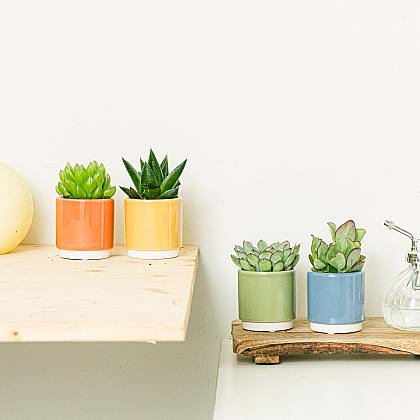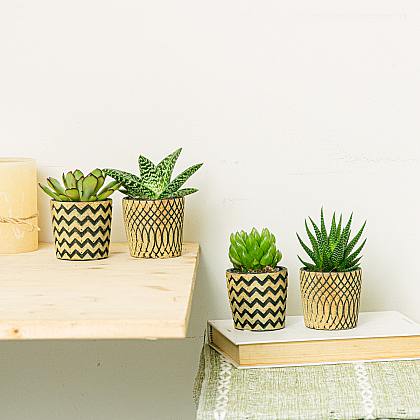Don't let the cold ruin your houseplants – learn how to protect them
In this article, we'll talk about how to protect your houseplants from the cold. As temperatures drop outside, it's important to make sure our houseplants are in a warm environment that's suitable for survival
In this article, we'll talk about how to protect your houseplants from the cold. As temperatures drop outside, it's important to make sure our houseplants are in a warm environment that's suitable for survival. The impact of cold weather can be devastating to our plants, so it's crucial to take preventative measures to avoid irreparable damage. From the right location to watering and humidity to ventilation and natural light, we'll cover must-have tips for keeping your houseplants healthy and happy during the colder months of the year.
The Impact of Cold on Houseplants
The impact of cold weather on houseplants can be devastating if the necessary precautions are not taken. Cold temperatures can negatively affect these plants, as many of them come from warmer, more tropical climates. The cold can cause damage to the leaves and stems, weakening the plant and even leading to its death. In addition, cold air can decrease humidity in the environment, which also affects houseplants that need adequate levels of humidity to survive. It is important to maintain a balance between temperature and humidity to protect these plants from the cold. In addition, it is essential to avoid direct exposure to cold drafts, such as those coming from open windows or doors. To protect houseplants from the cold, it is recommended to place them in places where they receive natural light but are not directly exposed to the sun, as the heat of the sun can quickly evaporate moisture from the soil and damage the leaves. It is also advisable to use curtains or blinds to regulate the temperature and avoid sudden changes. In summary, it is essential to take proper measures to protect houseplants from the cold, controlling temperature, humidity and avoiding direct exposure to cold drafts.
The Importance of the Right Location
The importance of the right location for our houseplants is crucial to protect them from the cold. By placing our plants in the right place, we can ensure that they will receive the right amount of light and warmth. First of all, we should avoid placing plants near windows or doors that are directly exposed to the cold. Cold drafts can damage leaves and cause plants to weaken. In addition, it is important to choose a location where the plants receive enough natural light. Plants need light to photosynthesize and grow properly. If they don't get the right amount of light, they can become weak and sickly. On the other hand, we must also consider the ambient temperature of the room. It is important to avoid placing plants near heat sources such as radiators or fireplaces, as this can dry out the air and damage them. Instead, it is preferable to look for places with a stable and moderate temperature. Proper placement also involves considering the size of the plant and its growth potential. Some plants may grow large and need more space, while others are smaller and can adapt to tighter spaces. In short, choosing the right location for our houseplants is essential to protect them from the cold and ensure their healthy growth.
The Power of Irrigation and Humidity
The Power of Irrigation and Humidity
Watering and humidity are key elements in protecting houseplants from the cold. During the colder months of the year, it is important to pay special attention to the amount and frequency of watering, as the soil tends to dry out more slowly due to the cold temperatures. It is essential to avoid both overwatering and underwatering, as both can be harmful to plants.
To maintain an adequate level of humidity, it is recommended to water the plants regularly but without waterlogging the substrate. It is important to check the moisture of the soil before each watering, using a moisture meter or simply sticking a finger into the soil to assess whether it is dry or wet. If the substrate is dry, it is necessary to water the plant, but if it is wet, it is preferable to wait a few days before watering again.
In addition to watering, it is beneficial to increase the ambient humidity around the plants. This can be achieved by placing a plate of water near them or using a humidifier. The extra humidity will help counteract the dry, warm air generated by heating systems during the winter.
Maintaining an adequate level of watering and humidity is essential to protect houseplants from the cold and ensure their health and survival during this season. With this care, we will be able to enjoy healthy and vibrant plants even on the coldest days of winter.
Take advantage of natural light for your plants
Take advantage of natural light for your plants
Natural light is a crucial element for the growth and development of houseplants. By placing your plants near a sunny window, you're providing them with the right amount of light they need to photosynthesize. However, it's important to note that not all plants require the same light intensity. Some species can tolerate direct sunlight, while others prefer softer lighting. Therefore, it is essential to know the lighting needs of each plant and adjust its location accordingly. Also, you should keep in mind that the position of the curtains or blinds can affect the amount of light that reaches your plants. Be sure to keep them open during the day to make the most of natural light. If you have plants that require less light, you may want to consider using translucent curtains or placing them in places where they won't get direct sunlight. Also remember that the orientation of the window can influence the amount of light that reaches your plants. south-facing windows typically receive more sunlight, while north-facing windows receive less. Observe how the light hits your home and place your plants accordingly to ensure their proper development.
The Crucial Role of Ventilation
Ventilation is a crucial aspect in the care of houseplants during the cold months. Although it may seem counterintuitive, proper ventilation can help maintain the right temperature and prevent the accumulation of moisture in the environment, which can be harmful to some species. It's important to remember that plants also need to breathe and renew the air around them to stay healthy. However, caution is necessary with cold drafts, as they can damage the most sensitive leaves and flowers. Therefore, it is recommended to ventilate the room moderately and prevent cold air from reaching the plants directly. Additionally, it is important to ensure that ventilation does not cause a significant decrease in humidity in the environment, as some species require a certain amount of humidity to thrive. In summary, maintaining good ventilation in the room where the plants are located can help regulate the temperature and humidity of the environment, which is critical for their survival during the colder months of the year.
Beware of cold drafts
Beware of cold drafts, a factor to take into account to protect our houseplants during the winter. Cold drafts can cause irreparable damage to our plants, so it's important to avoid them. To do this, we need to make sure that windows and doors are tightly closed and sealed, especially at night when temperatures drop even further. In addition, it is advisable not to place our plants near sources of cold, such as air conditioning inlets or the currents that can be generated by fans. It's also important to note that some plants are more sensitive than others to cold drafts, such as cacti and succulents. Therefore, we must pay special attention to their location and avoid placing them in areas where they can receive these currents. In short, taking care of cold drafts is essential to protect our houseplants during the winter. We must avoid them by closing doors and windows tightly, keeping plants away from cold sources and paying attention to those species that are more sensitive. This way, we can make sure our plants survive the winter and look healthy all year round.
Extra precautions for sensitive species
Houseplants are a great way to decorate any space, but not all species are created equal. Some plants are more sensitive to cold than others and require extra precautions to protect them during the colder months of the year. If you have sensitive plants such as orchids or cacti, it's important to pay attention to the temperature and humidity in your home. It's a good idea to keep these plants away from windows or doors that can let in cold drafts. Also, if you have a central heating system, make sure it's not too close to your sensitive plants, as hot air can dry them out and damage them. Another precaution is to avoid watering these plants with cold water or directly from the tap, as this can cool their roots and affect their growth. Instead, use warm water and let it sit for a few hours before watering your plants. You may also want to consider using a humidifier to keep moisture in the air and prevent the leaves from drying out. Remember that each species has specific needs, so it's important to research the specific needs of your sensitive plants to properly protect them from the cold.
In short, protecting our houseplants from the cold is essential to ensure their growth and health. Through proper placement, controlled watering and humidity, taking advantage of natural light, proper ventilation, and taking care of cold drafts, we can ensure a conducive environment for our plants. However, we should always keep in mind extra precautions for sensitive species. Each plant is unique and requires specific care, so it's important to do your research and learn about the individual needs of each. This way, we can provide them with the best possible care and enjoy their beauty in our home. What measures do you take to protect your houseplants from the cold? Have you experienced any challenges in this regard?


